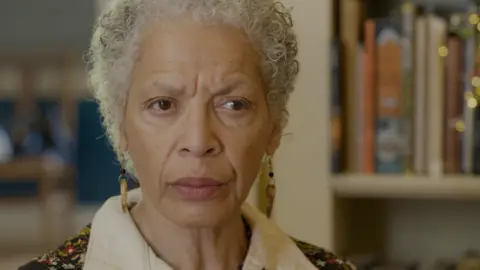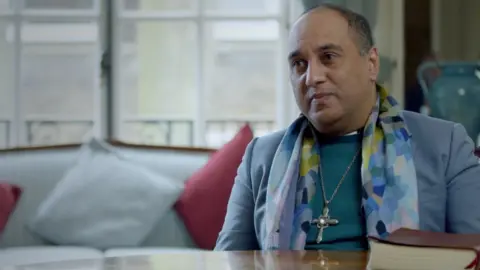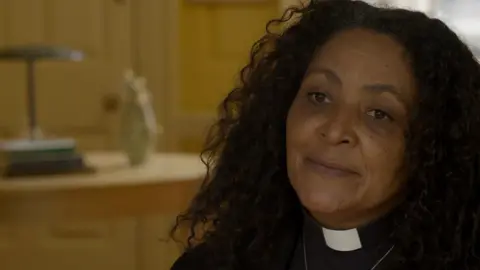Clergy speak out over 'racism in Church of England'
 BBC
BBCStaff complaining of racism in the Church of England have been paid off to "buy their silence", the BBC's Panorama programme has been told.
Former Church race-relations adviser Dr Elizabeth Henry says some had to sign non-disclosure agreements.
The Church is set to publish plans promising to address racism.
The Archbishop of Canterbury, the Most Rev Justin Welby, admitted last year the Church had failed to tackle racism in its own ranks.
'Deeply offensive'
After seven years in her job, Dr Henry retired last year feeling disillusioned.
"I felt frustrated by the lack of progress with issues of racism," she tells Panorama.
"A really shocking incident was a young black man who received a picture of a banana but that banana had his head superimposed upon it and underneath it said, 'Bananaman'.
"That is a deeply offensive and deeply racist image.
"He took it to HR [human resources department] and he did file a grievance - and the decision was that it was not racist.
"That person left and he received a very small compensation - however, he was forced to sign a non-disclosure agreement."
'Exceptional circumstances'
The Church told Panorama it could not comment on individual cases but "any [racist] behaviour of the sort described by Dr Henry is unacceptable".
It added confidentiality agreements were used only "in exceptional circumstances" where open processes "may not have reached resolution".

Brazilian-born Peterson Feital was a trainee vicar when he was hired by a church in London with a mainly white middle-class congregation.
His task was to reach out to diverse communities who do not normally attend church - and for a couple of years, Peterson thrived.
But when the vicar who hired him left, Peterson says, his life became very difficult.
"People of my kind, of my colour, are just not clever enough," he says.
'Diversity show'
He says his new manager told him: "Your English is not very good, I don't like your preaching, and you are too Brazilian in your compassion -you're not very coherent.
"Peterson, you've got to find a job with people of your kind.
"If the London diocese is going to give you a job, it's going to be for a diversity show.
"They're going to give you for a short period of time and they're going to drop you like we always do."
For seven years, Peterson says, he repeatedly complained to senior staff at the Diocese of London about the racism and bullying he experienced but was told to "keep his head down".
"No-one is going to be able to prove there's any racism," he says he was told.
And if he created a problem, "you're not going to get a job anywhere".
Claiming benefits
In March 2021, after 10 years in the Church, Peterson's contract was not renewed.
He was given a £2,000 redundancy payment and is now out of work and claiming benefits.
The Diocese of London said: "We are appalled at what Peterson has experienced.
"We have spoken with Peterson regarding the process for bringing formal complaints against those involved."

One in 25 of the Church's serving clergy belongs to an ethnic minority.
Hartlepool curate Michelle Delves, of mixed heritage, enrolled at Durham Bible college Cranmer Hall in 2016.
"When I got there, I've just never felt as black and poor - I felt like I'd landed on an alien planet," she says.
She was frequently ignored and treated differently, Michelle says, and when she complained, felt no-one was listening.
'Deeply sorry'
"The thing that really scares the pants off me about this institutional racism is that you don't know it's happening to you," she says.
Eventually, Michelle wrote to the Archbishop of Canterbury.
In response, his office described the "anger" of hearing about her experiences, adding: "Much more needs to be done about institutional racism in the Church."
Cranmer Hall told Panorama the college was "deeply sorry and saddened" to hear Michelle's story.
It had been unable to investigate while Michelle had been enrolled because she had not made a formal complaint but if she was willing to talk to the college authorities now, they would "explore her concerns thoroughly".
Over the past 35 years, there have been 20 reports examining racism in the Church, between them making more than 160 recommendations.
Some changes have been made but there is still a lot more to do, the Archbishop of York, the Most Rev Stephen Cottrell, says
"It is simply the case that ethnic-minority people are under-represented and disadvantaged in many of the structures and systems of our Church," he says.
"That has a terrible knock-on for our mission in the wider communities we serve."
But for Dr Henry, that admission is insufficient.
"It's almost like, 'OK, so the job is done,' but the confession, it is not a new phenomenon or a new awakening or a new enlightenment in the Church," she says.
"Based on the racial reckoning of the Church, I'm afraid they've abysmally failed - and it's not fit for purpose."
